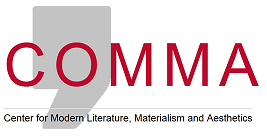Major Specializations
What is a Specialization?
The English major specializations offer a way for undergraduates in the English Department to optionally focus their elective coursework towards a specialized field of literary study. Four courses are required to complete a specialization, typically taken as part of the student’s normal English upper division elective course load, although some specializations allow the use of a limited number of out-of-Department courses.
Note: Major specializations are specific to the English Department so they are not recognized through the University. You don’t have to apply or anything like that. All you have to make sure is that you take at least 4 courses in the respected specialization and then during your degree candidacy quarter you will fill out the Specialization Forms.
There are eight official specializations. Students may also propose an independent specialization if they feel that their coursework possesses a focus not represented by any of the official Department specializations.
Once a student has enrolled in the last course that they require for the specialization, they can submit the certification request form to the Department and their achievement will be recognized upon graduation with a certificate.
Why Specialize?
The English Department Faculty includes prominent scholars at the forefront of current literary studies, scholars who are interested in introducing students to significant trends in contemporary research. The department offers traditional courses covering a range of historical periods and a variety of national and global literatures written in English. The English Department also offers a series of specializations in fields like Literature and Mind and Literature and the Environment. Students can learn how the digital humanities have transformed the literary landscape in the Literature & Culture of Information Specialization; or how the past informs the present in the Medieval or Early Modern specializations. Some of these specializations are connected with nationally-recognized research centers, which means that students can work on American literatures at the American Cultures & Global Contexts center; or on Renaissance texts in the Early Modern Center. They can work with leading scholars at the Transcriptions center or the Center On Modern Culture, Materialism, and Aesthetics (COMMA). In addition, the Las Maestras Center offers courses for students interested in developing an original creative voice and a critical intention in their imaginative writings. A full list of specializations is below.
The fundamental idea informing the Specializations is that students should be empowered to explore particular areas of interest through a disciplined itinerary of courses. In addition, particular specializations often work to create a collaborative community of research by offering certain extra-curricular events – e.g., conferences or colloquia or field trips, involving undergraduates, graduate students, and faculty.
Additionally, students are encouraged to develop their own particular specialization in consultation with a faculty advisor. Working together, the student and faculty advisor would tailor a specialization from already established course offerings.
Specialization Forms
All Degree Candidates will fill out a Google form to verify completion of the specialization. This form should be completed during the degree candidacy quarter for when you will graduate.
For unique situations that student is completing a specialization that is other than the ones offered by the English Department, please fill out this form below.
Download PDF:
Independent Specialization Agreement (66.87 KB)
Specialization Course Lists
Learn more about the courses filling specialization requirements:
- American Cultures & Global Contexts Specialization (2024-2025)
- Las Maestras Center/Creative Writing Specialization (2024-2025)
- Early Modern Specialization(2024-2025)
- Literature and Culture of Information Specialization (2024-2025)
Literature and the Environment Specialization (2024-2025)
- Literature and Mind Specialization (2024-2025)
- Medieval Literature Specialization (2024-2025)
- Modern Literature and Critical Theory Specialization (2023-2024)

